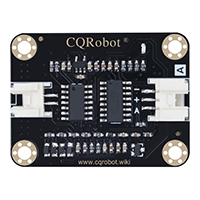TDS (Total Dissolved Solids) Meter Sensor SKU: CQRSENTDS01
Description
TDS (Total Dissolved Solids), Chinese name Total Dissolved Solids, also known as Total Dissolved Solids, indicates how many milligrams of dissolved solids are dissolved in 1 liter of water. Generally speaking, the higher the TDS value, the more dissolved substances contained in the water and the less clean the water. Therefore, the value of TDS can be used as one of the basis for reflecting the cleanliness of water. The commonly used TDS testing equipment is a TDS pen. Although it is cheap and easy to use, it cannot transmit data to the control system for long-term online monitoring and water quality analysis. Using a special instrument, although it can transmit data and has high accuracy, it is very expensive.
CQRobot has launched an arduino-compatible TDS sensor, which can be used to measure the TDS value of water after connecting to the arduino controller. This product is specially designed for arduino, plug and play, easy to use. 3.3V~5.5V wide voltage power supply, 0 to 2.3V analog signal output, making this product compatible with 5V and 3.3V control systems, it can be easily connected to existing control systems. With CQRobot ADS1115 16-bit AD conversion module (Model: CQRADS1115), it can accurately collect and convert analog signals to meet the compatibility requirements of the Raspberry Pi motherboard.
The excitation source for measurement uses AC signals, which can effectively prevent probe polarization, extend the life of the probe, and increase the stability of the output signal. The TDS probe is a waterproof probe that can be immersed in water for long-term measurement. This product can be applied to water quality testing in areas such as domestic water and hydroponics. With this sensor, you can easily DIY a TDS detector, easily detect the cleanliness of the water, and check your water quality.
Size Display
Specifications
Signal Transmitter Board Specifications
- Input Voltage: 3.3V to 5.5V
- Output Voltage: 0 to 2.3V
- Working Current: 3mA to 6mA
- TDS Measurement Range: 0 to 1000ppm
- TDS Measurement Accuracy: Plus/Minus 10% F.S. (25 Degree Celsius)
- Module Size: 43mm * 32.2mm
- Module Interface: JST 2.0mm 3-Pin
- Electrode Interface: JST 2.54mm 2-Pin
TDS Probe Specifications
- Number of Needle: 2
- Total Length: 83cm
- Connection Interface: JTS 2.54mm 2-Pin
- Color: Black
- Other: Waterproof Probe
Ocean Interface Cable Specifications
- Cable specifications: 22AWG
- Material: Silicone
- Withstand Voltage: Less Than 50V
- Withstand Current: Less Than 1000MA
- Length: 21cm
- Line Sequence: Black-Negative Power Supply, Red-Positive Power Supply, Green-Signal Terminal.
Connections and Examples
Attention
- The probe can not be used in water above 55 degrees centigrade.
- The probe can not be left too close to the edge of the container, otherwise it will affect the reading.
- The head and the cable of the probe are waterproof, but the connector and the signal transmitter board are not waterproof. Please be careful.
- This kit does not include CQRobot ADS1115 16-bit AD conversion module (Model: CQRADS1115), buyers need to purchase it separately.
- When using the TDS instrument sensor, the sensor probe is immersed in liquid, and the purchaser needs to Separate the sensor Probe Protective Cover to avoid incorrect data reading and malfunction.
- The TDS probe cannot be used in water above 55 degrees Celsius;
- The TDS probe should not be placed too close to the edge of the container, otherwise it will affect the sensor reading parameters;
- The TDS probe head and lead are made of waterproof material and can be immersed in water, but the cable interface and signal transfer board are not waterproof, please use them carefully.
Arduino Connections
Note: The DuPont female single-head wiring we distribute cannot be directly connected to the UNO R3 control board. Need to be in Stack the sensor expansion board on the UNO R3 control board, or connect the male-to-male Dupont wire to the Dupont female single-head wiring(Bread Wire). Raspberry Pi Test Code
- Connect the module to the Raspberry Pi 4B, and put the test code in the Raspberry Pi system in the form of a folder. Dial the ADD dial switch to the 0X48 end.
- In this experiment, the Raspberry Pi I2C communication function is used. You need to turn on the I2C function, enter sudo raspi-config in the Raspberry Pi system, and then perform the following operations.




